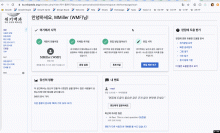When the user initiates the suggested edits module, there is a delay in loading the module onto the page, and a longer delay in loading the first suggested article. See gif below.
We should either increase the speed, or add some kind of loading animation. Increasing the speed is preferable, and so the first look should be from the engineers.
Also, the height of the module changes during loading. It starts out short, and then extends when the article cards show up. This causes the adjacent impact module to do the same.
Most of the slowness is due to the growthtasks API query. We can try several things to speed it up:
- Rendering the first task on the server-side by performing a search query for 1 article ({T236738: Newcomer tasks: server-side rendered version of suggested edits module})
- Use internal search instead of the server sending web requests to itself (T235717: Newcomer tasks: non-HTTP-based ConfigurationLoader and TaskSuggester)
- Instead of making six different search queries, combine them into a single one (means we won't have much control over the ordering / ratio of different task types)
- Alternatively, keep using web queries and use parallel HTTP requests (doesn't seem like a great long-term approach)
- Reduce the number of pages in the request (either by reducing the total number of cards we are showing, or by loading them in multiple batches)
- Reduce the work done in the API request: instead of doing a generator query, do a list query, and then use the received page IDs to fetch extra information in a separate request. (This is something we might want to do anyway because this way we can use query API continuation, while with a generator returning random results we cannot. Although other possible ways of fixing that exist.) The extra information can then again be batched. Alternatively, we might omit some things we already get from the PCS summary API (such as images).
- Push things into the search phase. Especially useful for page protection, since we use that for filtering: if we pushed the data into ElasticSearch, we'd get that for free, and seems like a useful CirrusSearch capability in general. (T259346: Add page protection filter to CirrusSearch)
- Decouple the rendering of various things (e.g. currently we wait for both the extract and the pageviews before displaying either). This is probably a micro-optimization with nontrivial code complexity so unlikely to be worth it.
- Cache things at various levels of aggressiveness (the first search result, or the first batch of search results, or all), and possibly include the cached data in the page HTML/JS. This adds a fair amount of complexity, and it won't speed up reloading the suggested edits module when the search parameters change (ie. the user changes the filters), but for other reloads (e.g. opening the homepage) this will be the most effective approach by far.
- Show the module while loading (e.g. Facebook shows blurred image and text). Doesn't affect actual speed but improves perceived one.
